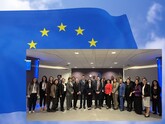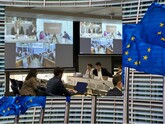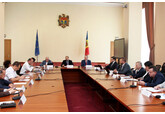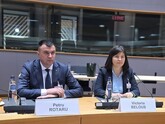
The National Bank of Moldova (NBM) has released a new explanatory video about its leading role in negotiations with the EU on monetary policy
According to the NBM, the video explains in simple terms the role of monetary policy in the lives of every citizen and emphasizes the importance of adopting the practices used by EU central banks in this area. The video emphasizes that the adoption of EU standards and best practices in monetary policy provides the central bank with the necessary framework to respond quickly and effectively to economic challenges, thereby protecting the purchasing power of every citizen. In the process of joining the European Union, the NBM coordinates, along with two other important chapters, the working group on monetary policy. This important role reflects the institution's commitment and responsibility to enhance the stability of the financial sector, strengthen institutional independence, and promote a functional economy that takes into account the interests of all citizens. The material emphasizes that financial stability and inflation control are directly reflected in citizens' everyday decisions, from current spending and saving for a trip to long-term plans. At the same time, the video presentation emphasizes that a stable economy means security for citizens' savings and predictability for the business environment. "Monetary policy decisions are not just technical interventions; they directly affect the ability of every citizen to make confident plans for the future. In line with European standards, the National Bank contributes to the creation of a solid, transparent economic foundation that ensures the security and well-being of citizens. It is therefore important to explain financial concepts in a way that everyone can understand, and through these videos, to explain the negotiations that the NBM is conducting as part of Moldova's accession negotiations with the European Union," emphasized NBM Governor Anca Dragu. The National Bank coordinates negotiations with the European Union on three chapters: free movement of capital, financial services, and economic and monetary policy. // 30.05.2025 — InfoMarket







